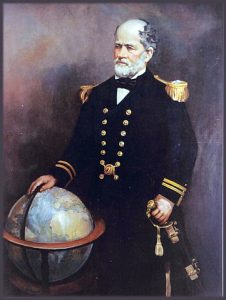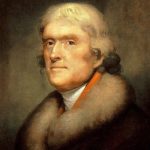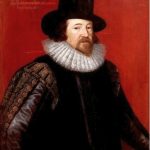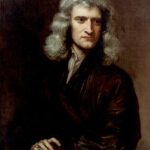The heavens declare the glory of God;
And the firmament shows His handiwork.
(Psalm 19:1)
 Several WallBuilders speakers just returned from engagements in Alaska, where they witnessed the incomprehensible wonder of the Northern Lights, the breathtaking beauty of the majestic mountain ranges, and the creative uniqueness of its wildlife. Throughout American history, those who believed Psalms 19 and explored God’s marvelous creation have had great impact on our science.
Several WallBuilders speakers just returned from engagements in Alaska, where they witnessed the incomprehensible wonder of the Northern Lights, the breathtaking beauty of the majestic mountain ranges, and the creative uniqueness of its wildlife. Throughout American history, those who believed Psalms 19 and explored God’s marvelous creation have had great impact on our science.
 For example, U.S. Navy Commander Matthew Fontaine Maury1 became known as “Father of Oceanography”2 and “Pathfinder of the Seas”3 because of what he discovered from reading Psalm 8 and Ecclesiastes 1. When criticized for his reliance on the Bible, Maury responded:
For example, U.S. Navy Commander Matthew Fontaine Maury1 became known as “Father of Oceanography”2 and “Pathfinder of the Seas”3 because of what he discovered from reading Psalm 8 and Ecclesiastes 1. When criticized for his reliance on the Bible, Maury responded:
I have been blamed by men of science, both in this country and in England, for quoting the Bible in confirmation of the doctrines of physical geography. The Bible, they say, was not written for scientific purposes and is therefore of no authority in matters of science. I beg pardon! The Bible is authority for everything it touches. . . . The Bible is true, and science is true. . . . They are both true; and when your men of science, with vain and hasty conceit, announce the discovery of disagreement between them, rely upon it: the fault is not with the Witness or His records [that is, God], but with the “worm” [sinful human] who essays [attempts] to interpret evidence which he does not understand.4

Thomas Jefferson, a diligent student of history, observed that:
The Christian religion…is a religion of all others most friendly to liberty, science, and the freest expansion of the human mind. 5
In fact, Jefferson said that “Bacon, Newton and Locke . . . [are] my trinity of the three greatest men the world had ever produced.” 6 While Locke was a Christian philosopher, both Bacon and Newton were Christian scientists. Notice the philosophy of these two.
 Francis Bacon, known as the “Father of Modern Science,” 7 developed the process of inductive thinking and created the scientific method. He also penned several books on religion, such as On the Unity in Religion (1612), On Atheism (1612), and Of Praise (1612), as well as a translation of Biblical psalms (1625).
Francis Bacon, known as the “Father of Modern Science,” 7 developed the process of inductive thinking and created the scientific method. He also penned several books on religion, such as On the Unity in Religion (1612), On Atheism (1612), and Of Praise (1612), as well as a translation of Biblical psalms (1625).
 Sir Isaac Newton as an English mathematician and scientist credited with birthing modern calculus and discovering the laws of universal gravitation. But he actually wrote more on theology than he did on science!
Sir Isaac Newton as an English mathematician and scientist credited with birthing modern calculus and discovering the laws of universal gravitation. But he actually wrote more on theology than he did on science!
There are many other examples, making clear that science as we know it today would not exist had it not been for those who used the Bible to lay the foundations of modern science.
(For more information on the Bible and Science, see the commentary for Daniel 1 in The Founders’ Bible).
Endnotes
1 For information about Matthew Fontaine Maury, see: Captain Miles P. DuVal, Jr., “Matthew Fontaine Maury,” Naval History and Heritage Command, December 11, 2015; Diane Fontaine Maury Corbin, A Life of Matthew Fontaine Maury (London: Sampson Low, Marston, Searle, & Rivington, 1888).
2 Howard J. Cohen, “Tributes to M. F. Maury, Pathfinder of the Seas,” Matthew Fontaine Maury (National Imagery and Mapping Agency, 2003), 4.
3 Charles Lee Lewis, Matthew Fontaine Maury: The Pathfinder of the Seas (Annapolis: The United States Naval Institute, 1927).
4 Corbin, Life of Matthew Fontaine Maury (1888), 178, “Maury’s Address at the Laying of the Corner-stone of the University of the South, on the Sewanee Mountains in East Tennessee, was delivered at the request of Bishop Otey on Nov. 30th, 1860.” See also Stephen McDowell, Matthew Fontaine Maury, the Pathfinder of the Seas (Charlottesville, VA: Providence Biblical Worldview University, 2011).
5 Thomas Jefferson to Moses Robinson, March 23, 1801, Memoir, Correspondence, and Miscellanies, ed. Thomas Jefferson Randolph (Charlottesville: F. Carr and Co., 1829), III:463.
6 Thomas Jefferson to Benjamin Rush, January 16, 1811, The Works of Thomas Jefferson, ed. Paul Leicester Ford (New York: G. P. Putnam’s Sons, 1905), XI:168.
4 The Works of Francis Bacon, ed. James Spedding (London: Longmans & Co., 1870), III:509, “Preface to the De Interpretatione Naturae Prooemium”; John Timbs, Stories of Inventors and Discoverers in Science and the Useful Arts (London: Kent and Co., 1860), 91, “Lord Bacon’s ‘New Philosophy”; David C. Innes, “The Novelty and Genius of Francis Bacon,” Piety and Humanity, February 11, 2010.
Still looking for answers? Visit our FAQ page
More Resources
Know the Truth and Protect Your Freedoms.
Still looking for answers? Visit our FAQ page
Stay Informed with the Latest Resources
Enter your email address to receive our regular newsletter, with important information and updates right in your inbox!










